-
 In this study, the author provides a critical analysis of the content of art. 2322 of the Civil Code that has entered into force on 1 October 2011, regulating for the first time, in terms of legislation, autonomous guarantee instrument of the letter of comfort. Given the lack of doctrinal explanations and of the Romanian jurisprudence in this regard, the author makes a comparative law analysis regarding the use of this instrument, employing as reference points the Common Law systems and Continental Law systems based on the existence of a Civil Code. This instrument is known since the early 1960s by the international transactions practice, but the corresponding case law is quite limited and in some legislation, although frequently used, letters of comfort are not subject to an expressis verbis legislative regulation. The author emphasizes the Romanian Civil Code modern nature together with the call for a consistent use, in practice, of this legal institution.
In this study, the author provides a critical analysis of the content of art. 2322 of the Civil Code that has entered into force on 1 October 2011, regulating for the first time, in terms of legislation, autonomous guarantee instrument of the letter of comfort. Given the lack of doctrinal explanations and of the Romanian jurisprudence in this regard, the author makes a comparative law analysis regarding the use of this instrument, employing as reference points the Common Law systems and Continental Law systems based on the existence of a Civil Code. This instrument is known since the early 1960s by the international transactions practice, but the corresponding case law is quite limited and in some legislation, although frequently used, letters of comfort are not subject to an expressis verbis legislative regulation. The author emphasizes the Romanian Civil Code modern nature together with the call for a consistent use, in practice, of this legal institution. -
 Întrebarea pe care ne-o punem cu toții este cum să construim o societate a bunăstării, în care să domnească cel puțin o bună înțelegere și toleranța, o societate non-agresivă, dacă o societate consensuală nu este posibilă. Răspunsul ar putea fi preferința pentru dialog; deci este necesară crearea de instituții și proceduri care prin mijloace juridice să asigure consolidarea democrației. Revizuirea Constituției este o importantă pârghie pentru a se atinge acest scop. Buna guvernare și consolidarea statului de drept se pot obține prin amplificarea rolului dreptului în sistemul politic statal, astfel încât democrația și o participare publică reală la formularea și adoptarea actelor normative secundare și chiar terțiare să fie consacrate prin norme juridice constituționale.
Întrebarea pe care ne-o punem cu toții este cum să construim o societate a bunăstării, în care să domnească cel puțin o bună înțelegere și toleranța, o societate non-agresivă, dacă o societate consensuală nu este posibilă. Răspunsul ar putea fi preferința pentru dialog; deci este necesară crearea de instituții și proceduri care prin mijloace juridice să asigure consolidarea democrației. Revizuirea Constituției este o importantă pârghie pentru a se atinge acest scop. Buna guvernare și consolidarea statului de drept se pot obține prin amplificarea rolului dreptului în sistemul politic statal, astfel încât democrația și o participare publică reală la formularea și adoptarea actelor normative secundare și chiar terțiare să fie consacrate prin norme juridice constituționale. -
 In respect of the contract of transport, the provisions of the new Romanian Civil Code in the matter (Articles 1955–2008) have the nature of general law, which, as the case may be, is supplemented by the special legislation, specific to each type of transport (rail, naval, road, air). Considering the above, this study makes an analysis of the provisions of the new Civil Code referring to a limited aspect, namely a summary on the rules of this Code, with reference to the civil-contractual liability of the transporter in the contract of transport of goods.
In respect of the contract of transport, the provisions of the new Romanian Civil Code in the matter (Articles 1955–2008) have the nature of general law, which, as the case may be, is supplemented by the special legislation, specific to each type of transport (rail, naval, road, air). Considering the above, this study makes an analysis of the provisions of the new Civil Code referring to a limited aspect, namely a summary on the rules of this Code, with reference to the civil-contractual liability of the transporter in the contract of transport of goods. -
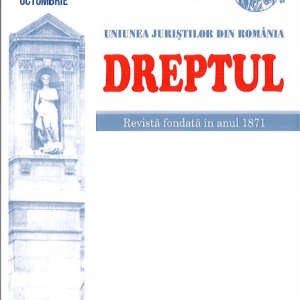 The author examines synthetically the changes brought to the institutional structure of the European Union by the Treaty of Lisbon. For this purpose, the author presents the essential institutional changes brought to: the European Parliament; the European Council; the Council; the European Commission (the Commission); the Court of Justice of the European Union.
The author examines synthetically the changes brought to the institutional structure of the European Union by the Treaty of Lisbon. For this purpose, the author presents the essential institutional changes brought to: the European Parliament; the European Council; the Council; the European Commission (the Commission); the Court of Justice of the European Union. -
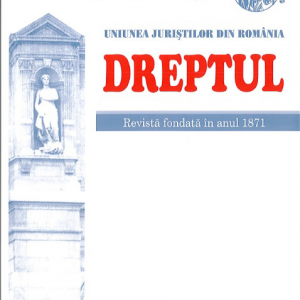 The present study aims at analyzing the new legal provisions regarding the country’s minimum gross salary guaranteed in payment. Recently, through a series of normative acts, the legislator renounced the old approach to the regulation of the minimum gross national salary guaranteed in payment, setting minimum differentiated salaries for certain categories of employees. Thus, employees with higher education and those with a minimum length of work will have a higher level of salary compared to the minimum gross salary guaranteed in payment. Moreover, the legislator set a higher threshold for the minimum wage in the construction sector, which benefits the employees of this sector of activity. This change of optics requires an analysis of its legality and timeliness. In order to outline the conclusions, there will be analyzed the internal sources, the provisions of ILO Convention No 131/1970 concerning Minimum wage fixing, with special reference to developing countries, and similar provisions in the field of minimum wage in different states.
The present study aims at analyzing the new legal provisions regarding the country’s minimum gross salary guaranteed in payment. Recently, through a series of normative acts, the legislator renounced the old approach to the regulation of the minimum gross national salary guaranteed in payment, setting minimum differentiated salaries for certain categories of employees. Thus, employees with higher education and those with a minimum length of work will have a higher level of salary compared to the minimum gross salary guaranteed in payment. Moreover, the legislator set a higher threshold for the minimum wage in the construction sector, which benefits the employees of this sector of activity. This change of optics requires an analysis of its legality and timeliness. In order to outline the conclusions, there will be analyzed the internal sources, the provisions of ILO Convention No 131/1970 concerning Minimum wage fixing, with special reference to developing countries, and similar provisions in the field of minimum wage in different states. -
 Potrivit art. 320 C.pr.pen., dacã pânã la începerea cercetãrii judecãtorești inculpatul declarã personal sau prin înscris autentic cã recunoaște sãvârșirea faptelor reținute în actul de sesizare a instanței și solicitã ca judecata sã se facã în baza probelor administrate în faza de urmãrire penalã, instanța va pronunța condamnarea inculpatului, care beneficiazã de reducerea cu o treime a limitelor de pedeapsã prevãzute de lege, în cazul pedepsei închisorii…
Potrivit art. 320 C.pr.pen., dacã pânã la începerea cercetãrii judecãtorești inculpatul declarã personal sau prin înscris autentic cã recunoaște sãvârșirea faptelor reținute în actul de sesizare a instanței și solicitã ca judecata sã se facã în baza probelor administrate în faza de urmãrire penalã, instanța va pronunța condamnarea inculpatului, care beneficiazã de reducerea cu o treime a limitelor de pedeapsã prevãzute de lege, în cazul pedepsei închisorii… -
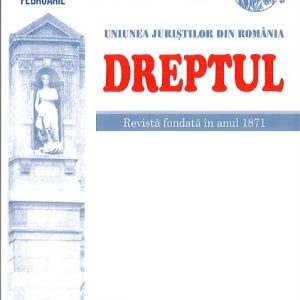 The article proposes procedural solutions, in compliance with the requirements of the ECHR practice, when changing the legal classification given to the deed, in appeal, by appreciating that the change in the legal classification given to the deed by the act of referral can be made by an undeniable conclusion, prior to the debate on the appeal, or by the conclusion for reinstating the case on the list of cases, provided that the court has debated the appeal, pending further ruling also for the reason concerning the change in the legal classification, which it found to be well-grounded.
The article proposes procedural solutions, in compliance with the requirements of the ECHR practice, when changing the legal classification given to the deed, in appeal, by appreciating that the change in the legal classification given to the deed by the act of referral can be made by an undeniable conclusion, prior to the debate on the appeal, or by the conclusion for reinstating the case on the list of cases, provided that the court has debated the appeal, pending further ruling also for the reason concerning the change in the legal classification, which it found to be well-grounded. -
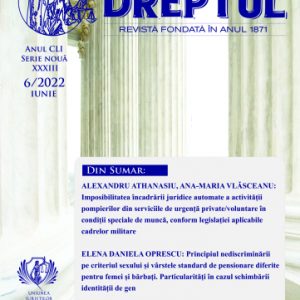
-
 In this study, by an inductive method, we will try to address the problem, the solution and the arguments that could be found in certain situations where there is a disagreement between the category of use of a land classified as forest and its actual legal situation, disagreement which unreasonably generates limitations of the right to build on the land in question. In case a land has mentioned in the title of property the category of use „Forest” (Pd), but this land does not actually meet the legal conditions provided by Articles 1, 2, 19 (1) and Article 20 (2) of the Law No 46/2008 on the Forest Code in order to be considered forest, in order to be part of the national forest fund and in order to be mandatorily subject to the regime of a forest arrangement, then this land must be considered only a land with forest vegetation outside the national forest fund or a simple land not subject in any way to the provisions of the Law No 46/2008 on the Forest Code, for which it is possible to request the change of the category of use according to Article 24 (1) and (2) of the Law No 46/2008 on the Forest Code.
In this study, by an inductive method, we will try to address the problem, the solution and the arguments that could be found in certain situations where there is a disagreement between the category of use of a land classified as forest and its actual legal situation, disagreement which unreasonably generates limitations of the right to build on the land in question. In case a land has mentioned in the title of property the category of use „Forest” (Pd), but this land does not actually meet the legal conditions provided by Articles 1, 2, 19 (1) and Article 20 (2) of the Law No 46/2008 on the Forest Code in order to be considered forest, in order to be part of the national forest fund and in order to be mandatorily subject to the regime of a forest arrangement, then this land must be considered only a land with forest vegetation outside the national forest fund or a simple land not subject in any way to the provisions of the Law No 46/2008 on the Forest Code, for which it is possible to request the change of the category of use according to Article 24 (1) and (2) of the Law No 46/2008 on the Forest Code. -
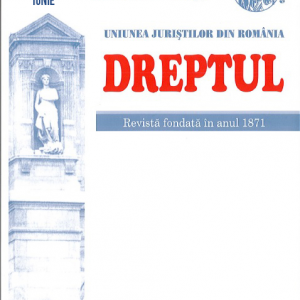 Recent legislative interventions have brought important innovations on mediation, and one of them has promoted the sanction of dismissing the claim as inadmissible in case of claimant’s failure to observe the obligation to participate in the briefing on the advantages of mediation. The author determines the conditions for applying this procedural sanction, which he considers extremely severe and even excessive. Inadmissibility for not participating in the briefing is being also examined in the light of the provisions of art. 21 of the Romanian Constitution, regarding the free access to justice and the provisions of art. 6 of the (European) Convention on Human Rights and Fundamental Freedoms. Secondly, the author notes that the sanction of inadmissibility applies only to the claimant. He believes, however, that the respondent may be subject to a judicial fine should he/she fail to appear in the briefing, according to Art. 187 item 1 letter f) of the new (Romanian) Code of Civil Procedure entered into force on February 15, 2013.
Recent legislative interventions have brought important innovations on mediation, and one of them has promoted the sanction of dismissing the claim as inadmissible in case of claimant’s failure to observe the obligation to participate in the briefing on the advantages of mediation. The author determines the conditions for applying this procedural sanction, which he considers extremely severe and even excessive. Inadmissibility for not participating in the briefing is being also examined in the light of the provisions of art. 21 of the Romanian Constitution, regarding the free access to justice and the provisions of art. 6 of the (European) Convention on Human Rights and Fundamental Freedoms. Secondly, the author notes that the sanction of inadmissibility applies only to the claimant. He believes, however, that the respondent may be subject to a judicial fine should he/she fail to appear in the briefing, according to Art. 187 item 1 letter f) of the new (Romanian) Code of Civil Procedure entered into force on February 15, 2013. -
 As expected, sanctions and solutions covered by the Code of Civil Procedure of 1865 were taken over by Law no. 134/2010 regarding the Code of Civil Procedure (republished) entering into force on February 1, 2013. In this regard, fines, voidness, decay, obsolescence, application rejection or accept are regulated. The latest law also establishes new sanctions and solutions, some of them unusual: closing the case, out of trial, trial settlement, ignoring, remaining ineffective.
As expected, sanctions and solutions covered by the Code of Civil Procedure of 1865 were taken over by Law no. 134/2010 regarding the Code of Civil Procedure (republished) entering into force on February 1, 2013. In this regard, fines, voidness, decay, obsolescence, application rejection or accept are regulated. The latest law also establishes new sanctions and solutions, some of them unusual: closing the case, out of trial, trial settlement, ignoring, remaining ineffective. -
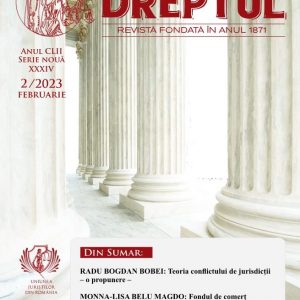
-
 The article proposes a sensitive topic in the Romanian criminal procedure, namely to determine the extent to which the cases of absolute nullity are limitatively provided by the Criminal Procedure Code (Article 281 of the Criminal Procedure Code) or whether there are cases of nullity of the processual or procedural documents which, although not included in the enumeration of Article 281 of the Criminal Procedure Code, are, however, veritable cases of absolute nullity. The problem is all the more delicate since the national doctrine is situated, up to this moment, in the comfort zone in which the cases of absolute nullity are equated to those of express nullity and those of relative nullity to those of virtual nullity. I have shown, with examples from the practice, but also from the doctrine (too timid so far), that there are situations of virtual absolute nullity of the criminal processual acts not even listed in the content of Article 281 of the Criminal Procedure Code, as well as the situations in which they may become incidental.
The article proposes a sensitive topic in the Romanian criminal procedure, namely to determine the extent to which the cases of absolute nullity are limitatively provided by the Criminal Procedure Code (Article 281 of the Criminal Procedure Code) or whether there are cases of nullity of the processual or procedural documents which, although not included in the enumeration of Article 281 of the Criminal Procedure Code, are, however, veritable cases of absolute nullity. The problem is all the more delicate since the national doctrine is situated, up to this moment, in the comfort zone in which the cases of absolute nullity are equated to those of express nullity and those of relative nullity to those of virtual nullity. I have shown, with examples from the practice, but also from the doctrine (too timid so far), that there are situations of virtual absolute nullity of the criminal processual acts not even listed in the content of Article 281 of the Criminal Procedure Code, as well as the situations in which they may become incidental. -
 The voting right of the shareholder at the general meeting of the shareholders is an accessory right to the ownership of the shares, by which the shareholder protects his interests and exercises the supervision and control over the management of the company. It is a true prerogative of the shareholder’s access to the substantiation of business decisions, which materialize through the will of the company. The exercise of the right to vote is governed by the principle of good faith and the principle of proportionality, but may be limited in the situation of the conflict of interests between the shareholder and the company. The shareholder in conflict of interests with the company is obliged to abstain from the vote, if by his vote it contributes to the formation of the majority of a decision with harmful consequences for the company. The situation of conflict of interests and the sanction of non-observance of the obligation to abstain from voting cannot be determined by the other shareholders, but only by the court. If, through the decision adopted with the participation of the shareholder in conflict of interests, a prejudice has occurred, the applicable sanction is the commitment of its liability. Such a decision is valid, but it can also be cancelled, provided that it is the result of a majority abuse. The same fate has the decision adopted by the minority shareholders with the abusive removal of the shareholder’s vote supposed to be in conflict of interests.
The voting right of the shareholder at the general meeting of the shareholders is an accessory right to the ownership of the shares, by which the shareholder protects his interests and exercises the supervision and control over the management of the company. It is a true prerogative of the shareholder’s access to the substantiation of business decisions, which materialize through the will of the company. The exercise of the right to vote is governed by the principle of good faith and the principle of proportionality, but may be limited in the situation of the conflict of interests between the shareholder and the company. The shareholder in conflict of interests with the company is obliged to abstain from the vote, if by his vote it contributes to the formation of the majority of a decision with harmful consequences for the company. The situation of conflict of interests and the sanction of non-observance of the obligation to abstain from voting cannot be determined by the other shareholders, but only by the court. If, through the decision adopted with the participation of the shareholder in conflict of interests, a prejudice has occurred, the applicable sanction is the commitment of its liability. Such a decision is valid, but it can also be cancelled, provided that it is the result of a majority abuse. The same fate has the decision adopted by the minority shareholders with the abusive removal of the shareholder’s vote supposed to be in conflict of interests. -
 In the practice of the courts in our country the punishment imposed for the offence of unintentional killing is, in most cases, imprisonment with suspended execution, even in the situations where the guilt rests solely on the offender or when there are several victims, a fact which can call into question the manner in which the principles governing the individualization of punishments are implemented, whereas, by imposing excessively lenient punishments, in relation to the seriousness of the facts, the desideratum concerning the educational and preventive role thereof is not achieved.
In the practice of the courts in our country the punishment imposed for the offence of unintentional killing is, in most cases, imprisonment with suspended execution, even in the situations where the guilt rests solely on the offender or when there are several victims, a fact which can call into question the manner in which the principles governing the individualization of punishments are implemented, whereas, by imposing excessively lenient punishments, in relation to the seriousness of the facts, the desideratum concerning the educational and preventive role thereof is not achieved. -
 In this study, the author explains the concepts of: structure of the registered capital; general pledge of the creditors; registered capital; difference between the registered capital and the patrimony of the company; difference between the registered capital and the equity capital (net assets); difference between the registered capital and the value of the company, as well as the problems of the legal regime of social contributions after payments, as all of the above follow from the Law No 31/1990 (republished) on companies.
In this study, the author explains the concepts of: structure of the registered capital; general pledge of the creditors; registered capital; difference between the registered capital and the patrimony of the company; difference between the registered capital and the equity capital (net assets); difference between the registered capital and the value of the company, as well as the problems of the legal regime of social contributions after payments, as all of the above follow from the Law No 31/1990 (republished) on companies. -
 Are separate opinions necessary? Writing them involves both time and resources, and the result does not influence the causes in which they were formulated. In this context, the logical question is why some national and international judges choose to formulate such opinions. We appreciate that the main reason is the potential of these opinions to contribute to the development of the future judicial practice. The aim of this study is to emphasize the importance and benefits of regulating the separate opinions in national legislation and to encourage their use. In this study we aim to analyze the purpose of the separate opinions along with the arguments for and against their regulation in national legislations. We will also analyze the difference between separate and concurring opinions, but also the different result that these opinions may have. We will also address the issue of the style in which these opinions are written and the impact it may have on future case law. A distinct part of this paper will be devoted to the analysis of separate opinions in national courts. At the same time, we will follow if there are differences between the constitutional court and the common law courts, regarding the use of these opinions. At the end of the study, we will make some proposals de lege ferenda on the need for legislative development of the field of separate and concurring opinions, development which would encourage their use and, at the same time, would limit the purpose of using these opinions to the development of the case law.
Are separate opinions necessary? Writing them involves both time and resources, and the result does not influence the causes in which they were formulated. In this context, the logical question is why some national and international judges choose to formulate such opinions. We appreciate that the main reason is the potential of these opinions to contribute to the development of the future judicial practice. The aim of this study is to emphasize the importance and benefits of regulating the separate opinions in national legislation and to encourage their use. In this study we aim to analyze the purpose of the separate opinions along with the arguments for and against their regulation in national legislations. We will also analyze the difference between separate and concurring opinions, but also the different result that these opinions may have. We will also address the issue of the style in which these opinions are written and the impact it may have on future case law. A distinct part of this paper will be devoted to the analysis of separate opinions in national courts. At the same time, we will follow if there are differences between the constitutional court and the common law courts, regarding the use of these opinions. At the end of the study, we will make some proposals de lege ferenda on the need for legislative development of the field of separate and concurring opinions, development which would encourage their use and, at the same time, would limit the purpose of using these opinions to the development of the case law. -
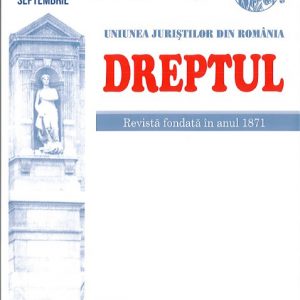 The attributions that confer substance to the activity of the prosecutor before the jurisdictional body are the participation in the trial of the criminal and civil cases, the exercise of the means of appeal against the judgments, the examination of the cases of non-uniform application of the law and the analysis of the cases in which the courts have delivered final judgments of acquittal, return or referral to the prosecutor. In criminal matters, the prosecutor mandatorily participates in the trial, under the sanction of absolute nullity, in the cases where the law expressly provides for his participation, and optionally, in cases other than those in which the law establishes the obligativity of participation. In civil matters, the rule is that the prosecutor takes part in the trial optionally, when he considers it necessary to defend the rule of law, the rights and interests of citizens. By way of exception, the prosecutor mandatorily participates in the trial of the civil cases when the obligativity is expressly provided. In criminal matters, the law opens for the prosecutor the path to exercise all means of appeal, ordinary (appeal, contestation) or extraordinary (recourse in cassation, contestation for annulment, revision), against various judgments. In civil matters, the prosecutor may exercise the means of appeal when he deems it is necessary to protect the rights and legitimate interests of minors, of the persons placed under interdiction and of the missing persons, or when he has participated in the trial of the case.
The attributions that confer substance to the activity of the prosecutor before the jurisdictional body are the participation in the trial of the criminal and civil cases, the exercise of the means of appeal against the judgments, the examination of the cases of non-uniform application of the law and the analysis of the cases in which the courts have delivered final judgments of acquittal, return or referral to the prosecutor. In criminal matters, the prosecutor mandatorily participates in the trial, under the sanction of absolute nullity, in the cases where the law expressly provides for his participation, and optionally, in cases other than those in which the law establishes the obligativity of participation. In civil matters, the rule is that the prosecutor takes part in the trial optionally, when he considers it necessary to defend the rule of law, the rights and interests of citizens. By way of exception, the prosecutor mandatorily participates in the trial of the civil cases when the obligativity is expressly provided. In criminal matters, the law opens for the prosecutor the path to exercise all means of appeal, ordinary (appeal, contestation) or extraordinary (recourse in cassation, contestation for annulment, revision), against various judgments. In civil matters, the prosecutor may exercise the means of appeal when he deems it is necessary to protect the rights and legitimate interests of minors, of the persons placed under interdiction and of the missing persons, or when he has participated in the trial of the case. -
 The correlation between parliament and democracy is a classical one. It has been proven not only by the beginnings of parliamentarism, related to limitation of the omnipotence of the monarch, but also by subsequent developments, especially in the generalization of universal suffrage, but also by the historical experience of the previous century, when the collapse of totalitarian or authoritarian regimes has always been followed by the return to parliamentarism or to a political system in which Parliament’s role is essential. After joining the European Union, its role was enhanced by its involvement in the European decision-making process.
The correlation between parliament and democracy is a classical one. It has been proven not only by the beginnings of parliamentarism, related to limitation of the omnipotence of the monarch, but also by subsequent developments, especially in the generalization of universal suffrage, but also by the historical experience of the previous century, when the collapse of totalitarian or authoritarian regimes has always been followed by the return to parliamentarism or to a political system in which Parliament’s role is essential. After joining the European Union, its role was enhanced by its involvement in the European decision-making process. -
 By comparison, the author examines the role of national parliaments in the treaties establishing the European Communities, the European Union (subsequent to the Treaty of Amsterdam), and then, much more in detail, the role of national parliaments in the Treaty of Lisbon (effective since 1 December 2009). At the end, the author examines the (indirect) influence of the Treaty of Lisbon on the legislative deliberative process in the Parliament of Romania.
By comparison, the author examines the role of national parliaments in the treaties establishing the European Communities, the European Union (subsequent to the Treaty of Amsterdam), and then, much more in detail, the role of national parliaments in the Treaty of Lisbon (effective since 1 December 2009). At the end, the author examines the (indirect) influence of the Treaty of Lisbon on the legislative deliberative process in the Parliament of Romania. -
 By comparison, the author examines the role of national parliaments in the treaties establishing the European Communities, the European Union (subsequent to the Treaty of Amsterdam), and then, much more in detail, the role of national parliaments in the Treaty of Lisbon (effective since 1 December 2009). At the end, the author examines the (indirect) influence of the Treaty of Lisbon on the legislative deliberative process in the Parliament of Romania.
By comparison, the author examines the role of national parliaments in the treaties establishing the European Communities, the European Union (subsequent to the Treaty of Amsterdam), and then, much more in detail, the role of national parliaments in the Treaty of Lisbon (effective since 1 December 2009). At the end, the author examines the (indirect) influence of the Treaty of Lisbon on the legislative deliberative process in the Parliament of Romania. -
 The study under the heading above reviews the relationship between the European Parliament and national parliaments of the 27 EU Member States (including, where appropriate their regional parliaments) in the light of provisions brought under the Treaty of Lisbon (effective since December 1st, 2009).
The study under the heading above reviews the relationship between the European Parliament and national parliaments of the 27 EU Member States (including, where appropriate their regional parliaments) in the light of provisions brought under the Treaty of Lisbon (effective since December 1st, 2009). -
 The judicial practice, including that of the Supreme Court, reveals difficulties in applying the sanction of nullity, in particular in case of virtual nullities. In this context, the author shows that it is necessary an applied analysis of the theory of nullity, in order to establish a staging of the judicial approach undertaken for applying this sanction. An interdisciplinary approach for the purpose of establishing the role of the condition of injury in such approach contributes to the avoidance of the confusion of the virtual nullity with the relative one.
The judicial practice, including that of the Supreme Court, reveals difficulties in applying the sanction of nullity, in particular in case of virtual nullities. In this context, the author shows that it is necessary an applied analysis of the theory of nullity, in order to establish a staging of the judicial approach undertaken for applying this sanction. An interdisciplinary approach for the purpose of establishing the role of the condition of injury in such approach contributes to the avoidance of the confusion of the virtual nullity with the relative one. -
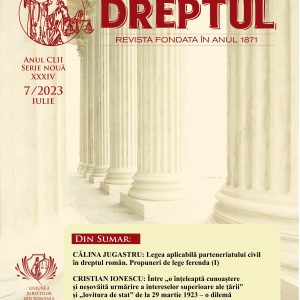
-
 The practice of the constitutional jurisdiction court points out that the exercise of the constitutionality control does not lead only to the ruling of some simple solutions, by which the criticized text or texts of the law are found to be or not in compliance with the rules of the Fundamental Law. The complexity of this control, in close connection with the growing complexity of the regulations, but also with the desideratum of legal security, which must be equally considered in exercising the constitutionality control, makes that the solutions of the Constitutional Court be also expressed in different forms. This study makes an analysis of the decisions of the Constitutional Court pertaining to the category circumstantiated by the term „interpretative decisions”, in order to emphasize their importance and their role in the process of constitutionalization of law. Certainly, the achievement of constitutionality control involves, in itself, a process of interpretation and comparison of the constitutional rules and, respectively, of the infraconstitutional ones. Within the interpretative decisions, however, this comparative examination has a greater complexity, constituting an emphasis of more possible interpretations and the identification of the one which complies with the provisions of the Constitution. Such an analysis also raises for discussion the role of the Constitutional Court in the process of interpretation of the legal infraconstitutional rules, an interpretation facilitated by the provisions of the Fundamental Law, its basis and the limits of the jurisdiction of the Court.
The practice of the constitutional jurisdiction court points out that the exercise of the constitutionality control does not lead only to the ruling of some simple solutions, by which the criticized text or texts of the law are found to be or not in compliance with the rules of the Fundamental Law. The complexity of this control, in close connection with the growing complexity of the regulations, but also with the desideratum of legal security, which must be equally considered in exercising the constitutionality control, makes that the solutions of the Constitutional Court be also expressed in different forms. This study makes an analysis of the decisions of the Constitutional Court pertaining to the category circumstantiated by the term „interpretative decisions”, in order to emphasize their importance and their role in the process of constitutionalization of law. Certainly, the achievement of constitutionality control involves, in itself, a process of interpretation and comparison of the constitutional rules and, respectively, of the infraconstitutional ones. Within the interpretative decisions, however, this comparative examination has a greater complexity, constituting an emphasis of more possible interpretations and the identification of the one which complies with the provisions of the Constitution. Such an analysis also raises for discussion the role of the Constitutional Court in the process of interpretation of the legal infraconstitutional rules, an interpretation facilitated by the provisions of the Fundamental Law, its basis and the limits of the jurisdiction of the Court. -
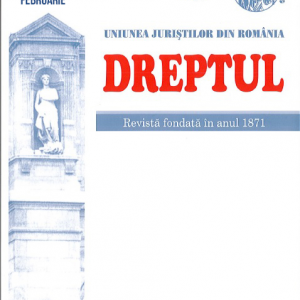 This article investigates how the postcommunist Romanian political regime was defined, with particular emphasis on the settlement of legal conflicts of a constitutional nature through the decisions of the Constitutional Court. Through this research we aim to identify the successive incarnations of the political regime, having as a reference the dynamics of the postcommunist Romanian political regime in relation to the continuous and varied relationship of the forces of political actors, as well as to the way in which they interpret and apply the constitutional norms. The originality of this research lies in the fact that in the analysis of the Romanian political regime we will combine the normative-institutional perspective with the perspective of the political and institutional practice, in order to obtain a complex picture, overall, on the way of formation and articulation of the Romanian political regime. The article highlights a permanent evolution of the political regime in relation to the continuous and varied relations determined by the forces relations of the political actors, as well as by the way in which the constitutional rules are interpreted and applied by them. The intrusion into the Constitutional Court’s jurisprudence in settling legal conflicts of a constitutional nature confirms the analysis of the political scientist Giovanni Sartori, according to which the alternation of the nature of the post-communist Romanian political regime is determined by the political and institutional practice built in relation to the political relationship between the president and the parliamentary majority. Defining the nature of the Romanian political regime helps us to understand the dynamics and frequency of constitutional crises
This article investigates how the postcommunist Romanian political regime was defined, with particular emphasis on the settlement of legal conflicts of a constitutional nature through the decisions of the Constitutional Court. Through this research we aim to identify the successive incarnations of the political regime, having as a reference the dynamics of the postcommunist Romanian political regime in relation to the continuous and varied relationship of the forces of political actors, as well as to the way in which they interpret and apply the constitutional norms. The originality of this research lies in the fact that in the analysis of the Romanian political regime we will combine the normative-institutional perspective with the perspective of the political and institutional practice, in order to obtain a complex picture, overall, on the way of formation and articulation of the Romanian political regime. The article highlights a permanent evolution of the political regime in relation to the continuous and varied relations determined by the forces relations of the political actors, as well as by the way in which the constitutional rules are interpreted and applied by them. The intrusion into the Constitutional Court’s jurisprudence in settling legal conflicts of a constitutional nature confirms the analysis of the political scientist Giovanni Sartori, according to which the alternation of the nature of the post-communist Romanian political regime is determined by the political and institutional practice built in relation to the political relationship between the president and the parliamentary majority. Defining the nature of the Romanian political regime helps us to understand the dynamics and frequency of constitutional crises -
 Air pollution is the biggest environmental threat to public health; every year, it generates the premature illness and death of over 5 million people worldwide and over 400 000 inhabitants of the EU. Such realities and the proliferation of the cases of non-compliance with the legal regulations and the measures adopted to prevent and combat air pollution have generated an increasing and more diverse judicial contentious, both at national level and at the level of the jurisdictions of the EU. By the Judgment of 26 June 2019, the Court of Justice of the EU has pronounced a solution for the reference for a preliminary ruling raised before a Belgian tribunal on the interpretation of Articles 6, 7, 13 and 23 and of Annex III of Directive 2008/50/EC. The intention was to find out to what extent the national jurisdictions can control the location of the sampling points and if it is possible to establish an average value, starting from the results of the different measuring stations, in order to evaluate the compliance with the limit values. The Court of Justice of the European Union has stated that national jurisdictions are competent to control the choice of the location of the air quality measurement stations and to take, with respect to the national authorities concerned, any relevant national measure; in order to evaluate the compliance with the limit-values, the pollution level of each sampling point must be taken individually. The new case law of the Luxembourg court contributes to strengthening the environmental contentious and its role in ensuring the application of the regulations in this field.
Air pollution is the biggest environmental threat to public health; every year, it generates the premature illness and death of over 5 million people worldwide and over 400 000 inhabitants of the EU. Such realities and the proliferation of the cases of non-compliance with the legal regulations and the measures adopted to prevent and combat air pollution have generated an increasing and more diverse judicial contentious, both at national level and at the level of the jurisdictions of the EU. By the Judgment of 26 June 2019, the Court of Justice of the EU has pronounced a solution for the reference for a preliminary ruling raised before a Belgian tribunal on the interpretation of Articles 6, 7, 13 and 23 and of Annex III of Directive 2008/50/EC. The intention was to find out to what extent the national jurisdictions can control the location of the sampling points and if it is possible to establish an average value, starting from the results of the different measuring stations, in order to evaluate the compliance with the limit values. The Court of Justice of the European Union has stated that national jurisdictions are competent to control the choice of the location of the air quality measurement stations and to take, with respect to the national authorities concerned, any relevant national measure; in order to evaluate the compliance with the limit-values, the pollution level of each sampling point must be taken individually. The new case law of the Luxembourg court contributes to strengthening the environmental contentious and its role in ensuring the application of the regulations in this field. -
 Potrivit art. 52 alin. (1) C.pr.pen., instanța penală este competentă să judece orice chestiune prealabilă soluționării cauzei, chiar dacă prin natura ei acea chestiune este de competența altei instanțe, cu excepția situațiilor în care competența de soluționare nu aparține organelor judiciare, iar conform alin. (2) al aceluiași articol, chestiunea prealabilă se judecă de către instanța penală, potrivit regulilor și mijloacelor de probă privitoare la materia căreia îi aparține acea chestiune. Conform alineatului (3) al art. 52 C.pr.pen., hotărârile definitive ale altor instanțe decât cele penale asupra unei chestiuni prealabile în procesul penal au autoritate de lucru judecat în fața instanței penale (cu notă aprobativă).
Potrivit art. 52 alin. (1) C.pr.pen., instanța penală este competentă să judece orice chestiune prealabilă soluționării cauzei, chiar dacă prin natura ei acea chestiune este de competența altei instanțe, cu excepția situațiilor în care competența de soluționare nu aparține organelor judiciare, iar conform alin. (2) al aceluiași articol, chestiunea prealabilă se judecă de către instanța penală, potrivit regulilor și mijloacelor de probă privitoare la materia căreia îi aparține acea chestiune. Conform alineatului (3) al art. 52 C.pr.pen., hotărârile definitive ale altor instanțe decât cele penale asupra unei chestiuni prealabile în procesul penal au autoritate de lucru judecat în fața instanței penale (cu notă aprobativă). -
 Potrivit prevederilor art. 1345 C.civ., „cel care, în mod neimputabil, s-a îmbogățit fără justă cauză în detrimentul altuia este obligat la restituire, în măsura pierderii patrimoniale suferite de cealaltă persoană, dar fără a fi ținut dincolo de limita propriei sale îmbogățiri”
Potrivit prevederilor art. 1345 C.civ., „cel care, în mod neimputabil, s-a îmbogățit fără justă cauză în detrimentul altuia este obligat la restituire, în măsura pierderii patrimoniale suferite de cealaltă persoană, dar fără a fi ținut dincolo de limita propriei sale îmbogățiri” -
 The scientific approach of the authors starts from the fact that, when it comes to concepts such as, for example, resilience or victimology, which can not be understood or applied without a multidisciplinary, interdisciplinary or even transdisciplinary approach (see the conclusion which the authors have reached with regard to the possibility of appearance of a new discipline, namely legal resilience), the competences of the legal science specialists, in general, and of those in the field of criminal law, in particular, together with the competences of the specialists in psychology, psychiatry, and others, are extremely important. The authors place the above-mentioned concepts on the law – psychology – psychiatry interface and they analyze them from the perspective of the criminal justice and of the relationship between the persons involved, respectively the victims of crimes (minors and adults to the same extent), with society, but also with the aggressor, both before committing the criminal act and thereafter. Moreover, with respect to resilience and victimology, after it is pointed out that they do not have unique definitions, generally-accepted, there are also revealed the essential points on which those involved in the research of these matters have agreed upon, as well as the exchange of information and of procedures performed at the the boundary between resilience and victimology. At the same time, the criminal justice is not treated under a retributive aspect, but more from the point of view of a reparative, restorative justice, of the means by which it contributes to the mental health of the victims, of the populations that live in traumatized societies, to repairing the social trauma, to establishing the causes and the prevention of victimization, etc. At the same time, the authors also present the guarantees of the right to a fair trial granted to the victims of crimes, as well as some regulations intended to prevent victimization and to grant legal protection to the persons in precarious situations, such as: refugees, mentally ill, abandoned children and others.
The scientific approach of the authors starts from the fact that, when it comes to concepts such as, for example, resilience or victimology, which can not be understood or applied without a multidisciplinary, interdisciplinary or even transdisciplinary approach (see the conclusion which the authors have reached with regard to the possibility of appearance of a new discipline, namely legal resilience), the competences of the legal science specialists, in general, and of those in the field of criminal law, in particular, together with the competences of the specialists in psychology, psychiatry, and others, are extremely important. The authors place the above-mentioned concepts on the law – psychology – psychiatry interface and they analyze them from the perspective of the criminal justice and of the relationship between the persons involved, respectively the victims of crimes (minors and adults to the same extent), with society, but also with the aggressor, both before committing the criminal act and thereafter. Moreover, with respect to resilience and victimology, after it is pointed out that they do not have unique definitions, generally-accepted, there are also revealed the essential points on which those involved in the research of these matters have agreed upon, as well as the exchange of information and of procedures performed at the the boundary between resilience and victimology. At the same time, the criminal justice is not treated under a retributive aspect, but more from the point of view of a reparative, restorative justice, of the means by which it contributes to the mental health of the victims, of the populations that live in traumatized societies, to repairing the social trauma, to establishing the causes and the prevention of victimization, etc. At the same time, the authors also present the guarantees of the right to a fair trial granted to the victims of crimes, as well as some regulations intended to prevent victimization and to grant legal protection to the persons in precarious situations, such as: refugees, mentally ill, abandoned children and others. -

-
 The author argues that, for repeated offense and continued criminal offense, the time of the offense, which determines reversal of the conditional suspension of execution of sentence is the first time the constituent elements of the offense were met and not when the offense was completely consummated. If the first time when the elements of the offense that enter the natural or legal unity of the repeated or continued criminal offense were met was discovered after the expiry of the trial period, the court shall not rule the reversal of the conditional suspension of execution of sentence.
The author argues that, for repeated offense and continued criminal offense, the time of the offense, which determines reversal of the conditional suspension of execution of sentence is the first time the constituent elements of the offense were met and not when the offense was completely consummated. If the first time when the elements of the offense that enter the natural or legal unity of the repeated or continued criminal offense were met was discovered after the expiry of the trial period, the court shall not rule the reversal of the conditional suspension of execution of sentence. -
 The postponing of the application of punishment is an institution recently introduced in the Criminal Code, creating problems of interpretation both in the doctrine and in the judicial practice, especially on two levels: the terminology used and the systematization of the substantive and procedural provisions in the legislation. These issues affect the institutions of the revocation and annulment of postponing the application of punishment.
The postponing of the application of punishment is an institution recently introduced in the Criminal Code, creating problems of interpretation both in the doctrine and in the judicial practice, especially on two levels: the terminology used and the systematization of the substantive and procedural provisions in the legislation. These issues affect the institutions of the revocation and annulment of postponing the application of punishment. -
 The problem of admissibility of revocation of the legal acts of labour law issued by the employer has been disputed for more than four decades. Within this framework, this study supports the affirmative solution, namely that of revocability by the employer of all its unilateral acts. Essential arguments consist in the specific nature of the labour legal relations, specific nature which excludes the application of the civil rules as rules of common law, according to Article 278 (1) of the Labour Code. While in the civil law the unilateral legal acts are, as a rule, irrevocable, in the labour law – an autonomous branch of law – the same category of acts are revocable.
The problem of admissibility of revocation of the legal acts of labour law issued by the employer has been disputed for more than four decades. Within this framework, this study supports the affirmative solution, namely that of revocability by the employer of all its unilateral acts. Essential arguments consist in the specific nature of the labour legal relations, specific nature which excludes the application of the civil rules as rules of common law, according to Article 278 (1) of the Labour Code. While in the civil law the unilateral legal acts are, as a rule, irrevocable, in the labour law – an autonomous branch of law – the same category of acts are revocable. -
 Este în afara oricărei îndoieli că tradiționala clasificare a constituțiilor în constituții rigide și în constituții suple rămâne o teză unanim admisă de către constituționaliști. Cei care critică această clasificare o fac fie din ignoranță (și aici replicile sunt inutile), fie din motive pur electorale, mai mult sau mai puțin motivate. Pentru liniștea sufletească a acestora din urmă, trebuie să se observe că doctrina constituțională explică foarte clar faptul că rigiditatea unei constituții nu se opune revizuirii sale. Rigiditatea constituțională este de fapt un procedeu tehnic (constituțional) care se legitimează prin stabilitatea în timp a constituției, ca trăsătură definitorie a acesteia. Iar stabilitatea constituției se fondează, la rândul său, pe realitatea că o constituție este o reformă, este cea mai complexă reformă, a cărei exprimare cere timp și, de ce să nu o spunem, răbdare.
Este în afara oricărei îndoieli că tradiționala clasificare a constituțiilor în constituții rigide și în constituții suple rămâne o teză unanim admisă de către constituționaliști. Cei care critică această clasificare o fac fie din ignoranță (și aici replicile sunt inutile), fie din motive pur electorale, mai mult sau mai puțin motivate. Pentru liniștea sufletească a acestora din urmă, trebuie să se observe că doctrina constituțională explică foarte clar faptul că rigiditatea unei constituții nu se opune revizuirii sale. Rigiditatea constituțională este de fapt un procedeu tehnic (constituțional) care se legitimează prin stabilitatea în timp a constituției, ca trăsătură definitorie a acesteia. Iar stabilitatea constituției se fondează, la rândul său, pe realitatea că o constituție este o reformă, este cea mai complexă reformă, a cărei exprimare cere timp și, de ce să nu o spunem, răbdare. -
 La 16 decembrie 2021 se împlinesc 150 de ani de când a văzut lumina tiparului primul număr al revistei „Dreptul”. Anul 1871 a avut o însemnătate aparte pentru lumea juriștilor români de atunci, marcând, pe de o parte, fondarea Societății Juridice și, pe de altă parte, apariția revistei „Dreptul”.
La 16 decembrie 2021 se împlinesc 150 de ani de când a văzut lumina tiparului primul număr al revistei „Dreptul”. Anul 1871 a avut o însemnătate aparte pentru lumea juriștilor români de atunci, marcând, pe de o parte, fondarea Societății Juridice și, pe de altă parte, apariția revistei „Dreptul”.
